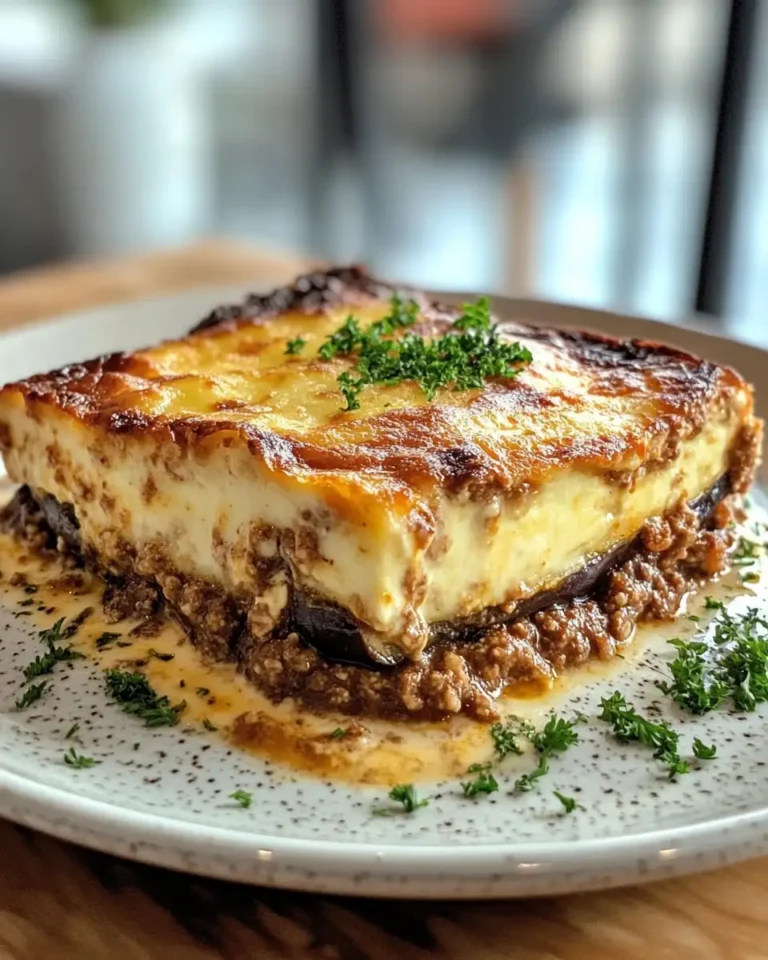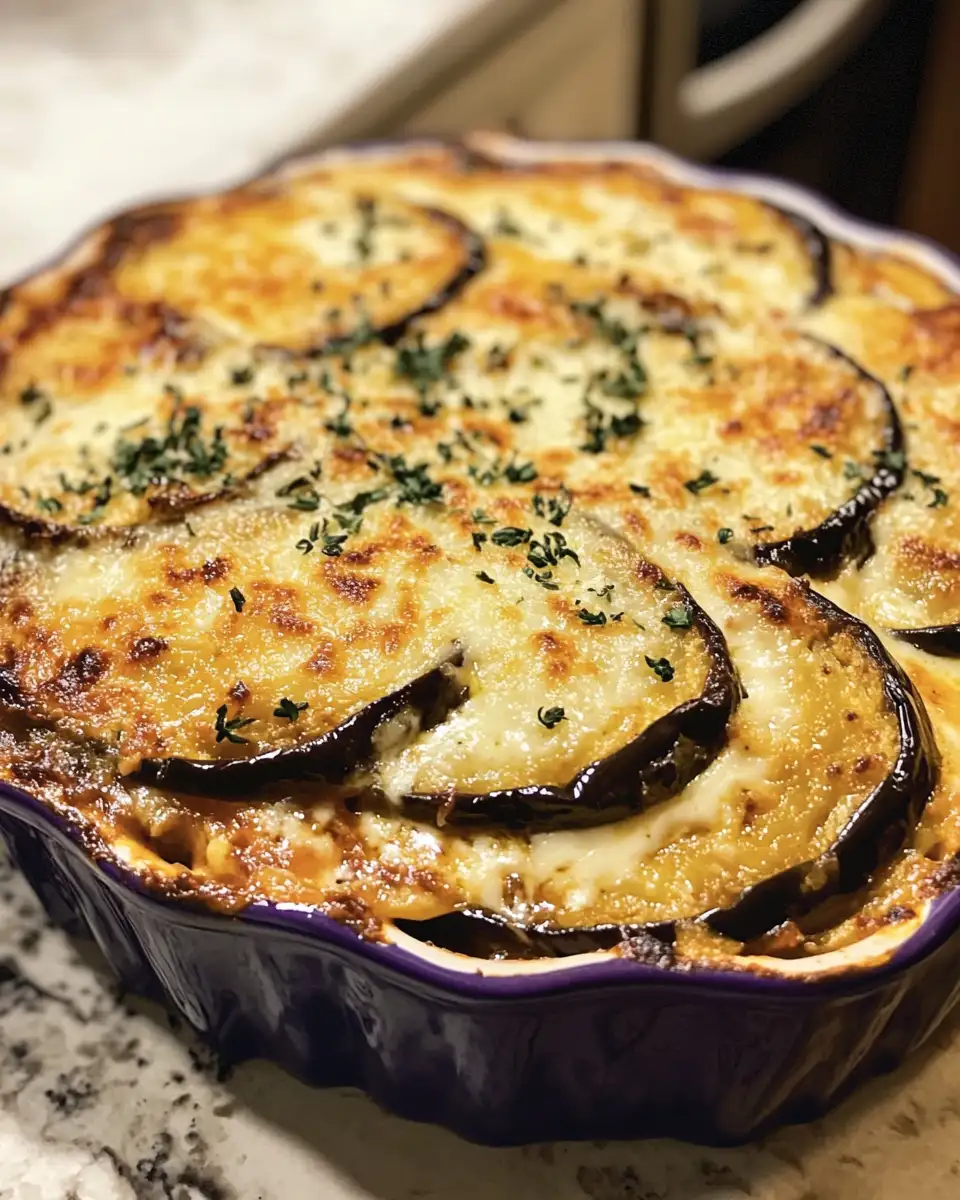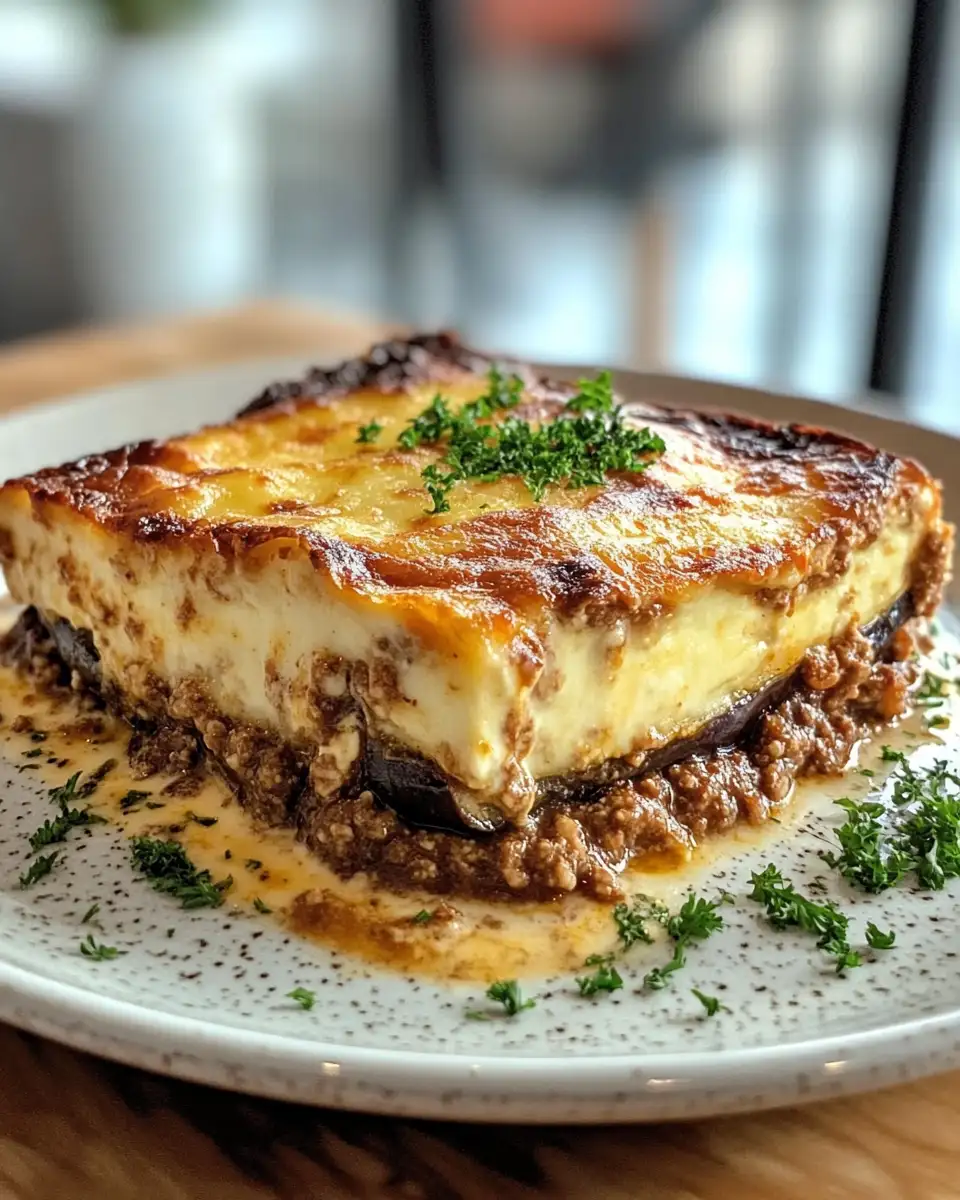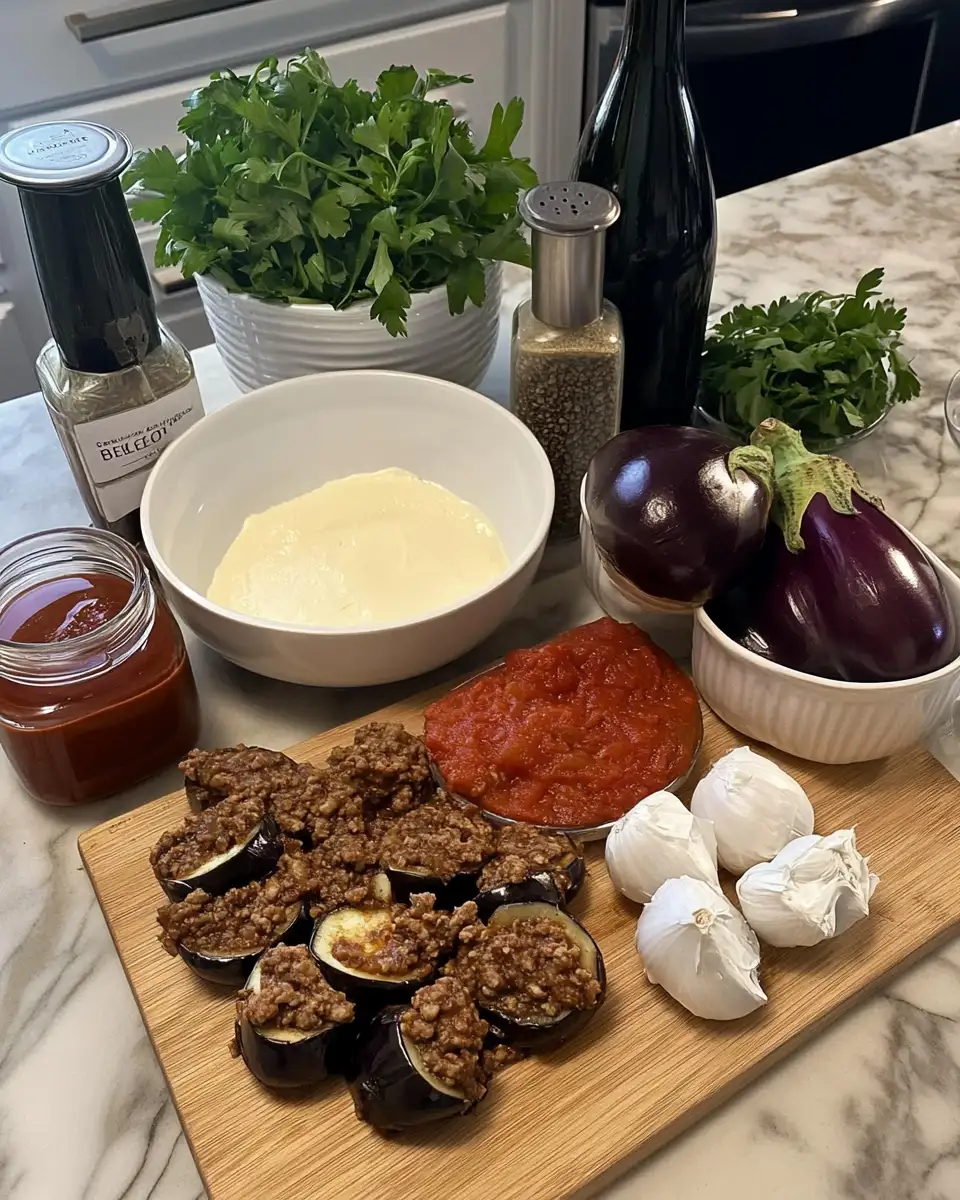Greek Eggplant Moussaka has always felt like a warm hug from my childhood kitchen—a recipe that carries the fragrant memories of my mum and grandmother bustling around, layering eggplant and rich béchamel in that classic, comforting way. Living here in sunny San Diego, I’ve adapted this dish to fit the rhythm of my busy family life, but its soul remains unchanged. Whether it’s a quiet dinner or a weekend gathering, making moussaka is my way of connecting the dots between my English roots, my years in professional kitchens, and the joyful chaos of feeding my kids. If you’ve never tried it, or if you’re after tips to make it effortlessly delicious, you’re in the right place.
Table of Contents
Why You’ll Love This Greek Eggplant Moussaka
This Greek Eggplant Moussaka is a perfect balance of layers, flavors, and textures that make it truly special. First, it’s the way the tender, roasted eggplant melds with a savory, spiced meat sauce—reminding me of those evenings spent in restaurant kitchens where every layer mattered. The creamy béchamel topping brings a luscious finish that’s indulgent but not overwhelming. Lastly, this dish is incredibly adaptable, easy enough for weeknight dinners yet impressive for guests. It’s become a family favorite because it feeds both the body and the soul, just like the meals I grew up sharing.
Ingredients You’ll Need for This Greek Eggplant Moussaka
The key to this dish lies in selecting the right ingredients—fresh, quality produce really elevates the flavors. I always seek out firm, glossy eggplants with smooth skin, and when possible, I choose grass-fed beef or lamb for the meat sauce to add depth. Having spent years in kitchens where ingredient quality was non-negotiable, I believe that even simple dishes like moussaka shine brightest when components are thoughtfully chosen. Feel free to swap lamb for beef or use a plant-based mince for a twist.
- 2 large eggplants (about 2 pounds), sliced into 1/2-inch rounds
- 3 tablespoons olive oil, plus extra for roasting
- 1 medium onion, finely chopped
- 3 garlic cloves, minced
- 1 pound ground beef or lamb
- 1 can (14 oz) crushed tomatoes
- 2 tablespoons tomato paste
- 1 teaspoon ground cinnamon
- 1/2 teaspoon ground allspice
- Salt and freshly ground black pepper, to taste
- 1/4 cup red wine or beef broth (optional, but adds depth)
- For the béchamel sauce:
- 4 tablespoons unsalted butter
- 1/4 cup all-purpose flour
- 2 1/2 cups whole milk, warmed
- 1/4 teaspoon freshly grated nutmeg
- 2 large eggs, beaten
- 1/2 cup grated Parmesan or Kefalotyri cheese
- Fresh parsley, chopped (for garnish)
Nutrition Facts
- Calories: Approximately 450 per serving
- Protein: 28g
- Fat: 28g (mostly from olive oil, butter, and meat)
- Carbohydrates: 20g
- Fiber: 6g
- Sugar: 8g (mainly from tomatoes and milk)
- Sodium: 520mg (adjust based on added salt)

Discover the Authentic Flavors of Greek Eggplant Moussaka
Learn how to make delicious Greek Eggplant Moussaka. Easy recipe with step-by-step instructions.
- Total Time: 45 minutes
- Yield: 4 servings 1x
Ingredients
The key to this dish lies in selecting the right ingredients—fresh, quality produce really elevates the flavors. I always seek out firm, glossy eggplants with smooth skin, and when possible, I choose grass-fed beef or lamb for the meat sauce to add depth. Having spent years in kitchens where ingredient quality was non-negotiable, I believe that even simple dishes like moussaka shine brightest when components are thoughtfully chosen. Feel free to swap lamb for beef or use a plant-based mince for a twist.
- 2 large eggplants (about 2 pounds), sliced into 1/2-inch rounds
- 3 tablespoons olive oil, plus extra for roasting
- 1 medium onion, finely chopped
- 3 garlic cloves, minced
- 1 pound ground beef or lamb
- 1 can (14 oz) crushed tomatoes
- 2 tablespoons tomato paste
- 1 teaspoon ground cinnamon
- 1/2 teaspoon ground allspice
- Salt and freshly ground black pepper, to taste
- 1/4 cup red wine or beef broth (optional, but adds depth)
- For the béchamel sauce:
- 4 tablespoons unsalted butter
- 1/4 cup all-purpose flour
- 2 1/2 cups whole milk, warmed
- 1/4 teaspoon freshly grated nutmeg
- 2 large eggs, beaten
- 1/2 cup grated Parmesan or Kefalotyri cheese
- Fresh parsley, chopped (for garnish)
Instructions
- Preheat your oven to 400°F (200°C). Arrange the eggplant slices on baking sheets, brush both sides lightly with olive oil, and season with salt. Roast for 20-25 minutes, flipping halfway through, until golden and tender. This step is key to avoid sogginess later.
- While the eggplant roasts, heat 3 tablespoons olive oil in a large pan over medium heat. Sauté the onion until translucent, about 5 minutes, then add the garlic and cook for another minute.
- Add the ground meat to the pan, breaking it up with a spoon. Cook until browned and no longer pink. Stir in the crushed tomatoes, tomato paste, cinnamon, allspice, salt, and pepper. Pour in red wine or broth if using. Let the sauce simmer gently for 20 minutes, uncovered, until thickened. Adjust seasoning to taste.
- For the béchamel, melt butter in a saucepan over medium heat. Whisk in the flour and cook for 2-3 minutes, stirring constantly, to form a roux. Gradually whisk in the warm milk, ensuring no lumps, and cook until thickened and creamy, about 5-7 minutes.
- Remove the béchamel from heat. Stir in nutmeg and gradually whisk in the beaten eggs and half of the cheese. The sauce should be smooth and velvety.
- Lower oven temperature to 350°F (175°C). In a baking dish, layer half the roasted eggplant, then spread all the meat sauce evenly over it. Add the remaining eggplant on top.
- Pour the béchamel sauce over the final layer, smoothing it out. Sprinkle with remaining cheese.
- Bake for 45-50 minutes until the top is golden and bubbling. Let the moussaka rest for at least 15 minutes before serving to set properly.
- Prep Time: 15 minutes
- Cook Time: 30 minutes
- Category: Main Dish
- Method: Cooking
- Cuisine: International
Steps to Create Your Greek Eggplant Moussaka
- Preheat your oven to 400°F (200°C). Arrange the eggplant slices on baking sheets, brush both sides lightly with olive oil, and season with salt. Roast for 20-25 minutes, flipping halfway through, until golden and tender. This step is key to avoid sogginess later.
- While the eggplant roasts, heat 3 tablespoons olive oil in a large pan over medium heat. Sauté the onion until translucent, about 5 minutes, then add the garlic and cook for another minute.
- Add the ground meat to the pan, breaking it up with a spoon. Cook until browned and no longer pink. Stir in the crushed tomatoes, tomato paste, cinnamon, allspice, salt, and pepper. Pour in red wine or broth if using. Let the sauce simmer gently for 20 minutes, uncovered, until thickened. Adjust seasoning to taste.
- For the béchamel, melt butter in a saucepan over medium heat. Whisk in the flour and cook for 2-3 minutes, stirring constantly, to form a roux. Gradually whisk in the warm milk, ensuring no lumps, and cook until thickened and creamy, about 5-7 minutes.
- Remove the béchamel from heat. Stir in nutmeg and gradually whisk in the beaten eggs and half of the cheese. The sauce should be smooth and velvety.
- Lower oven temperature to 350°F (175°C). In a baking dish, layer half the roasted eggplant, then spread all the meat sauce evenly over it. Add the remaining eggplant on top.
- Pour the béchamel sauce over the final layer, smoothing it out. Sprinkle with remaining cheese.
- Bake for 45-50 minutes until the top is golden and bubbling. Let the moussaka rest for at least 15 minutes before serving to set properly.
Tips for Making the Best Greek Eggplant Moussaka
Getting this dish just right is all about technique and patience. I learned early on that rushing or skimping on any step can turn this from a comforting masterpiece into a soggy disappointment. Here’s what I keep in mind:
- Salt the eggplant slices and let them sit for 30 minutes before roasting to draw out bitterness and excess moisture.
- Don’t skip roasting the eggplant; it adds a smoky depth and keeps layers from becoming watery.
- Use whole milk for the béchamel—low-fat versions don’t thicken as well and can alter the sauce’s silkiness.
- Whisk eggs into the béchamel off the heat to avoid scrambling.
- Allow the moussaka to rest after baking—this helps the layers firm up, making slicing easier and neater.
Even after years of cooking both professionally and at home with my kids, these little details make all the difference. Learn more: related recipe Learn more: Discover the Ultimate Steak Burrito Bowl Experience
Serving Suggestions and Pairings

This dish is incredibly versatile and works beautifully for various occasions, from casual family suppers to more formal gatherings. Its hearty richness pairs wonderfully with light, fresh sides to balance the palate.
- Serve with a crisp Greek salad of cucumber, tomato, red onion, olives, and feta dressed with lemon and oregano
- Pair with a chilled glass of Assyrtiko or a dry white wine to complement the earthy spices
- Offer warm, crusty bread or pita to soak up the sauce
- For a seasonal twist, add layers of thinly sliced zucchini or potatoes alongside the eggplant
In my home, this moussaka often stars on weekends when we have time to linger at the table. The kids love digging in, especially with extra ketchup on the side—an unexpected but joyful addition!
Storage and Reheating Tips
Proper storage ensures you can enjoy leftovers just as much as the fresh dish. I often make moussaka in larger batches to have ready meals for busy days.
- Store in an airtight container in the refrigerator for up to 3 days
- For longer storage, freeze individual portions wrapped tightly for up to 2 months
- Reheat gently in the oven at 325°F (160°C) until warmed through to preserve the béchamel’s texture
- If microwaving, add a splash of milk or cream and cover loosely to retain moisture
Frequently Asked Questions
What are the main ingredients for Greek Eggplant Moussaka?
The main ingredients for Greek Eggplant Moussaka include the items listed in our ingredients section above. Each ingredient plays a crucial role in achieving the perfect flavor and texture.
How long does it take to make Greek Eggplant Moussaka?
The total time to make Greek Eggplant Moussaka includes both preparation and cooking time. Check the recipe card above for exact timing details.
Can I make Greek Eggplant Moussaka ahead of time?
Yes, Greek Eggplant Moussaka can often be prepared in advance. Store it properly in an airtight container in the refrigerator and consume within the recommended timeframe.
What can I serve with Greek Eggplant Moussaka?
Greek Eggplant Moussaka pairs well with various sides and accompaniments. Consider the serving suggestions mentioned in the recipe for the best dining experience.
Is Greek Eggplant Moussaka suitable for special diets?
Depending on the ingredients used, Greek Eggplant Moussaka may be adapted for various dietary needs. Check the ingredients list and consider substitutions as needed for your dietary requirements.
Final Thoughts
Greek Eggplant Moussaka isn’t just a recipe; it’s a story layered with tradition, adaptation, and love. I hope this guide inspires you to make it your own and share it with those you care about. Please drop a comment or tag me if you try it—I’d love to hear your stories and tweaks!















